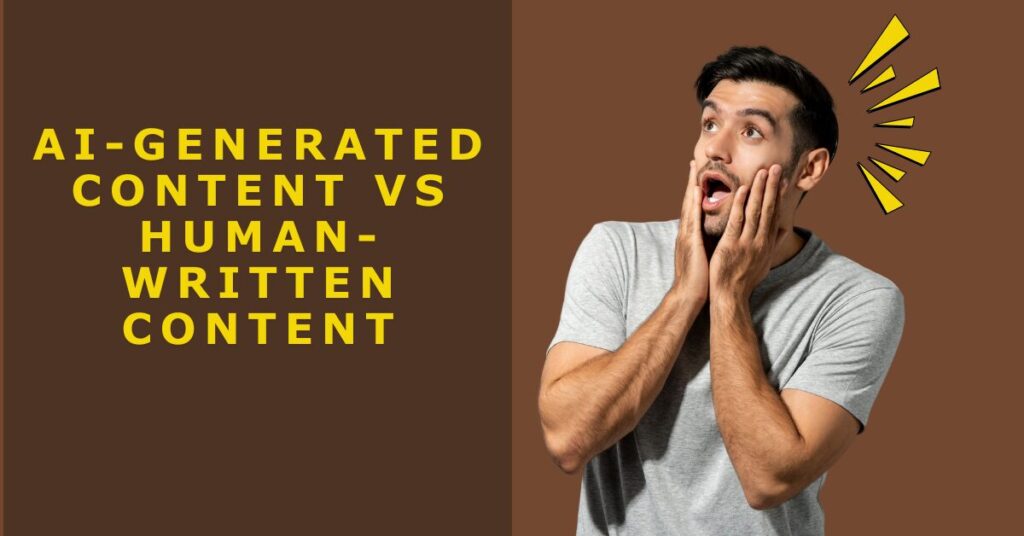In the digital era, content is king, and producing high-quality, engaging content is key to ranking well on Google. As artificial intelligence (AI) technology advances, more businesses and content creators are turning to AI for writing articles, blogs, and other digital content. But is AI-generated content really a good substitute for human-written content? In this article, we’ll compare AI-generated content vs human-written content in terms of SEO performance, quality, and overall effectiveness. Let’s explore which approach is best for boosting your website’s Google ranking.
What is AI-Generated Content?
AI-generated content refers to content created using machine learning algorithms, natural language processing (NLP), and other AI technologies. Tools like Jasper AI, Writesonic, and Copy.ai are designed to automatically generate written content based on user input. These tools can create blog posts, product descriptions, social media content, and more, all with minimal human intervention.
What is Human-Written Content?
Human-written content, on the other hand, is content crafted by a writer who uses creativity, expertise, and knowledge of the subject matter. Humans can infuse personality, tone, and emotional engagement into their writing, providing a unique perspective and building a deeper connection with the audience.
AI-Generated Content vs Human-Written Content: Key Differences
1. Quality and Creativity
AI-Generated Content:
AI tools can generate content quickly and at scale, but the quality often depends on the input and instructions given. While AI can produce well-structured, grammatically correct content, it might lack the creativity, depth, and nuance that come with human writing. AI-generated content is typically more formulaic and may struggle to create highly engaging or thought-provoking pieces.
Human-Written Content:
Human writers can inject creativity and originality into their content. They can understand nuances, capture emotions, and write in a way that resonates with readers. Humans can also craft more engaging, detailed, and in-depth content that reflects expertise and personal experience. While it may take longer to create, human-written content is often more compelling and capable of building stronger connections with readers.
Verdict: For high-quality, emotionally engaging, and creative content, human writers have the edge. However, AI is a great option for generating basic or informative content quickly.
2. SEO Performance
AI-Generated Content:
AI tools are often designed to optimize content for SEO by including keywords, meta descriptions, and internal/external links. Tools like Surfer SEO and Frase integrate SEO guidelines directly into the content creation process. AI can also analyze search intent and suggest keywords that will help rank higher on Google.
However, AI-generated content might still lack the contextual understanding needed to optimize for the latest SEO trends or Google’s evolving algorithms. For instance, AI might include keywords, but not in a way that aligns perfectly with user intent or the latest SEO best practices.
Human-Written Content:
Human writers have a better understanding of SEO nuances and can optimize content based on in-depth research and an understanding of audience needs. They can also write in a way that aligns with the latest Google algorithm changes, ensuring that content provides value to users while maintaining high SEO standards. Additionally, human writers can craft content that is optimized for readability, which is also an important SEO ranking factor.
Verdict: Human-written content tends to be better for nuanced SEO optimization, as human writers can combine their expertise with an understanding of the latest SEO trends.
3. Cost and Time Efficiency
AI-Generated Content:
AI tools can generate content in a fraction of the time it would take a human writer. This makes it a cost-effective solution for businesses that need large volumes of content quickly. AI tools also eliminate the need for multiple rounds of revisions, as the content is created almost immediately after the prompt is provided.
Human-Written Content:
Human writing takes more time and resources. Writers need time to research, create, and edit content to ensure it’s polished and error-free. For businesses on a tight deadline or with large content demands, this can be a challenge. However, the results tend to be more refined and tailored to the audience.
Verdict: AI-generated content is faster and more cost-effective for high-volume content production, while human-written content requires more time and investment but tends to offer higher quality and engagement.
4. Personalization and User Engagement
AI-Generated Content:
AI can tailor content to an extent by using specific inputs, but it may struggle to create deeply personalized content that truly resonates with individual readers. While AI can produce content that answers questions and addresses basic needs, it might fall short in creating content that emotionally connects with the audience.
Human-Written Content:
Human writers excel at personalizing content. They can adjust their tone, style, and content to suit specific audience needs, building trust and engagement. Humans can also infuse unique storytelling, humor, and relatable elements into their writing, making it more engaging and shareable.
Verdict: Human-written content is more effective for personalization and building strong relationships with your audience.
Pros and Cons of AI-Generated Content vs Human-Written Content
| Criteria | AI-Generated Content | Human-Written Content |
|---|---|---|
| Speed | Fast content creation | Slower, requires more time |
| Cost | Lower cost, especially for bulk content | Higher cost, especially for specialized content |
| Creativity | Limited creativity, often formulaic | Highly creative, emotional, and personalized |
| SEO Optimization | Can optimize for SEO but may lack nuance | Better at optimizing for SEO, especially for complex queries |
| Engagement | Can be less engaging, lacks emotional depth | Stronger emotional connection, better at engaging the reader |
| Accuracy & Expertise | May lack in-depth expertise and accuracy | Can showcase expertise, especially in specialized niches |
When Should You Use AI-Generated Content?
AI-generated content is a great solution for:
-
Content Scaling: If you need a large volume of content quickly (e.g., product descriptions, blog posts, or social media content), AI is ideal.
-
Basic Content: When the content doesn’t require in-depth expertise or creativity, AI tools can provide good results.
-
SEO-Optimized Articles: AI tools like Surfer SEO can help create keyword-optimized articles efficiently.
When Should You Use Human-Written Content?
Human-written content is ideal for:
-
In-Depth and Specialized Content: For highly technical, niche, or in-depth articles, a human writer’s expertise is invaluable.
-
Brand Voice and Engagement: When content needs to resonate emotionally with the audience or align with your brand voice.
-
Thought Leadership: When you want to showcase your expertise and build trust with your audience.
Conclusion: AI-Generated Content vs Human-Written Content
Both AI-generated content and human-written content have their advantages and drawbacks. AI is a great tool for scaling content quickly and cost-effectively, especially for SEO purposes. However, human-written content excels in creativity, emotional engagement, and producing in-depth, expert-driven content.
For the best results, many businesses find a hybrid approach works best: use AI tools for basic content generation and SEO optimization, and rely on human writers for in-depth articles, personalization, and high-level engagement. By combining the strengths of both, you can create a content strategy that’s both efficient and effective, helping you rank higher on Google and connect with your audience.



